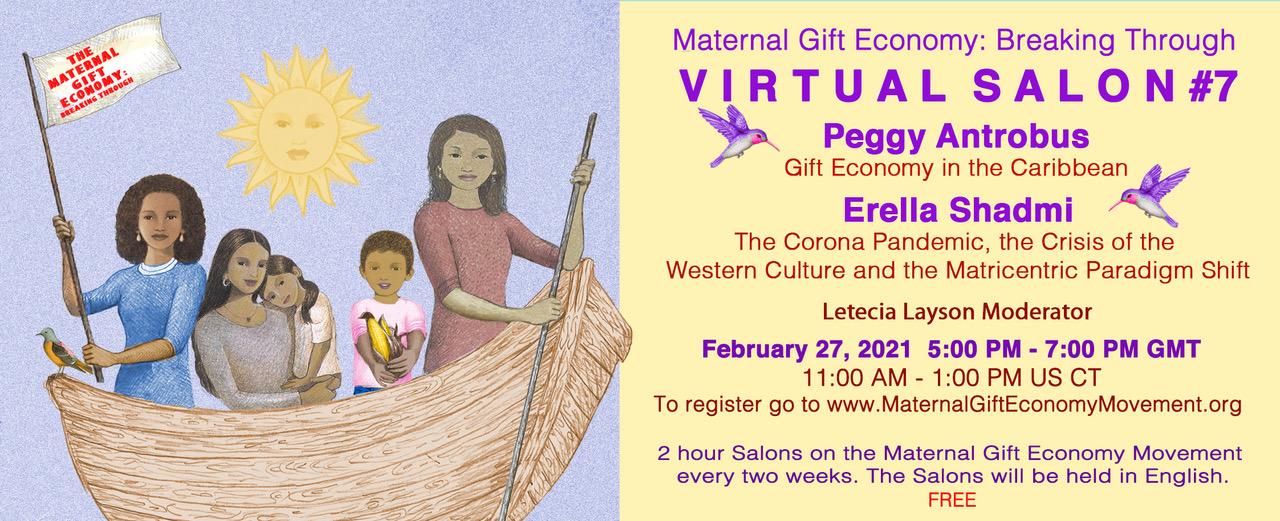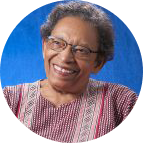
Salon #07 - February 27, 2021
Erella Shadmi and Peggy Antrobus

Dr. Erella Shadmi
Presentation title: The Corona Pandemic, the Crisis of the Western Culture and the Matricentric Paradigm Shift
We needed a global crash to make people around the globe realize what some activists already were aware of - that a Western civilization is in deep crises and that a comprehensive shift is necessary. Despite the health danger and police brutality, thousands of people around the globe keep protesting to express their mistrust in the existing institutions. As their vast voluntarism, reluctance to social distancing, mistrust in the authorities show, and insistence on protesting show, they also grasp the meaning of the alternative – the gift economy rather than capitalism, communalism rather than individualism, and the grassroots voice and participative democracy rather than the political system and a powerful state.
To prevent the powerful forces and the corporate regime from appropriating these changes for their own interests as they have been doing for generations, it is important to conceptualize them as part of an alternative paradigm, which is outside and beyond white Western culture, patriarchy and capitalism. Such a paradigm begins with motherhood and mothering and is founded on the integration of the maternal gift economy, matriarchal legacy, and indigenous knowledge. It offers new ways to understand humanity, social order and value system and alternative ways of thinking, being and doing.
Dr. Erella Shadmi is an Israeli feminist, peace, lesbian and pro-Mizrachi (Arab-Jews) activist and independent researcher on women and feminism, police and policing. As a sociologist, I see myself as an observer of social processes and a translator of the wisdom of matricentric feminists to the world we live in. As an activist – and I am first and foremost an activist – I am a dreamer: I wish to drastically transform our world through opening the eyes and hearts of women and men to alternative ways of thinking, doing, and living, to show them how ideas may be translated into daily practices. In both my sociological work and activism, I am deeply influenced by what my matricentric and indigenous friends taught me.

Peggy Antrobus
Presentation title: Gift Economy in the Caribbean
In 1954, with talk if Independence in the air, I chose to read for a degree in economics in order to contribute to Caribbean development. It didn’t take me long to realize, from my first job in the Ministry of Finance in Jamaica, that what I had learned at a British university did not help me understand how Caribbean economies functioned. Feminism completed the disillusionment. Discovering the Matriarchal Gift Economy led me to a path to understanding how Caribbean people survived and thrived despite persistent unemployment rates of over 20% in many Caribbean countries.
My presentation will offer examples drawn from pre-Columbus indigenous communities, through plantation slavery and post-colonial experiences to the present response to the pandemic.
I will end with questions about what kind of policies might acknowledge the value of these manifestations of unconditional caring and solidarity and find ways of supporting rather than continuing to exploit them.
Peggy Antrobus Profile
I identify as a Caribbean feminist activist. Since the mid-1970s I have been involved in programs to advance women’s rights, first within the structure of government, later within the academy and now as part of a feminist-led global women’s movement.
My most significant and life-changing experience has been being part of the network of feminist researcher-activists from the Economic South advancing development alternatives with women for a new era (DAWN).
My interest in the Gift Economy came from realization of the fact that much of what allows Caribbean people (and economies) to survive and thrive takes place outside the Market, grounded in social relations of reciprocity and solidarity.
Today, in the context of the COVID-19 pandemic in which gifting, and women’s caring labor, much of it unwaged or low-waged, is the basis of survival for communities, even whole countries, I am interested in how the value of these practices might finally be recognized/acknowledged and reinforced though policies that support rather than continue to exploit this essential work.
